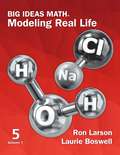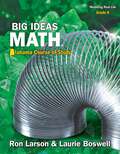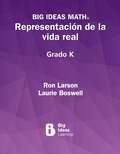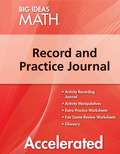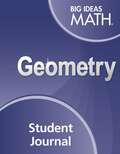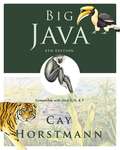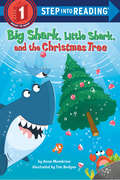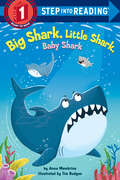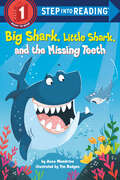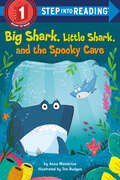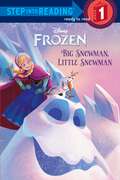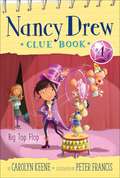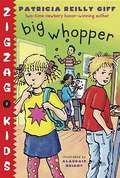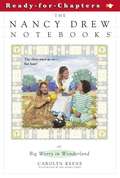- Table View
- List View
Big Ideas Math: Modeling Real Life, Grade 4, Volume 2
by Ron Larson Laurie BoswellNIMAC-sourced textbook
Big Ideas Math: Modeling Real Life, Grade 5, Volume 1
by Ron Larson Laurie BoswellNIMAC-sourced textbook
Big Ideas Math: Modeling Real Life, Grade K, Volume 1
by Ron Larson Laurie BoswellNIMAC-sourced textbook
Big Ideas Math: Modeling Real Life, Grade K, Volume 1 (Big Ideas Math)
by Ron Larson Laurie BoswellNIMAC-sourced textbook
Big Ideas Math: Modeling Real Life, Grade K, Volume 2
by Ron Larson Laurie BoswellNIMAC-sourced textbook
Big Ideas Math: Red Accelerated, A Common Core Curriculum , Record And Practice Journal
by Ron Larson Laurie BoswellNIMAC-sourced textbook
Big Java: Compatible with Java 5, 6 and 7 (4th Edition)
by Cay S. HorstmannThis book introduces programmers to objects at a gradual pace. The syntax boxes are revised to show typical code examples rather than abstract notation. This includes optional example modules using Alice and Greenfoot. The examples feature annotations with dos and don'ts along with cross references to more detailed explanations in the text. New tables show a large number of typical and cautionary examples. New programming and review problems are also presented that ensure a broad coverage of topics. In addition, Java 7 features are included to provide programmers with the most up-to-date information.
Big Shark, Little Shark and the Christmas Tree (Step into Reading)
by Anna MembrinoHurray! It's Christmas! Big Shark and Little Shark are on the hunt for Christmas tree decorations. Emergent readers who love Christmas will love this funny and easy-to-read Step 1.Big Shark and Little Shark find a Christmas tree! But some of the decorations are broken. No worries! Big Shark and Little Shark will find all the decorations they need. But who will live on the top of the tree? Shark fans and emergent readers will enjoy all the books starring these funny, finned friends!Big Shark, Little Shark (also available in Spanish!)Big Shark, Little Shark Go to School (also available in Spanish!) Big Shark, Little Shark, Baby Shark Big Shark, Little Shark and the Spooky Cave.Big Shark, Little Shark and the Missing Teeth Step 1 Readers feature big type and easy words for children who know the alphabet and are eager to begin decoding letter sounds. Rhyme, rhythm, and picture clues help support emergent reading skills.
Big Shark, Little Shark, Baby Shark (Step into Reading)
by Anna MembrinoJust when you thought it was safe...Big Shark and Little Shark return in this funny new Step 1 Reader, pursued by...Baby Shark!Big Shark and Little Shark may be opposites, but they agree on one thing--neither wants to play with Baby Shark. Baby Shark is too small and slow to be any fun...right? What happens when Mommy Shark, Daddy Shark, Grandpa Shark, and Grandma Shark find out that Baby Shark is being snubbed? Dun dun dun dun dun dun! All's well that ends well in this easily decodable and oh-so-familiar story of big kids and little kids resolving their conflicts. The book conveys a great social-emotional lesson about apologizing and inclusion in a funny way! Look for these other funny stories: Big Shark, Little Shark and Big Shark, Little Shark Go to School. Step 1 Readers feature big type and easy words for children who know the alphabet and are eager to begin reading. Rhyme and rhythmic text paired with picture clues help children decode the story.
Big Shark, Little Shark, and the Missing Teeth (Step into Reading)
by Anna MembrinoHurray! Big Shark lost another tooth! Little Shark wishes he would lose his first tooth. Emergent readers who are losing teeth of their own will love this funny and easy-to-read Step 1.Sharks lose teeth all the time! But Little Shark hasn't lost a single tooth...yet. And then Big Shark can't find his missing teeth that he's collected. Where could they be? Shark fans and emergent readers will enjoy all the books starring this funny pair of opposites:Big Shark, Little SharkBig Shark, Little Shark Go to SchoolBig Shark, Little Shark, Baby SharkBig Shark, Little Shark and the Spooky Cave. Step 1 Readers feature big type and easy words for children who know the alphabet and are eager to begin reading. Rhyme and rhythmic text paired with picture clues help children decode the story.
Big Shark, Little Shark, and the Spooky Cave (Step into Reading)
by Anna MembrinoJust in time for Halloween comes a spooky, funny early reader starring Big Shark and Little Shark!Big Shark is scared! The cave looks far too dark and spooky to swim into. But Little Shark isn't scared in the least! Can he coax Big Shark to explore? Some exciting surprises are waiting deep in the spooky cave! Shark fans and emergent readers will enjoy all the stories starring this odd couple: Big Shark, Little Shark; Big Shark, Little Shark Go to School; and Big Shark, Little Shark, Baby Shark. Step 1 Readers feature big type and easy words for children who know the alphabet and are eager to begin reading. Rhyme and rhythmic text paired with picture clues help children decode the story.
Big Snowman, Little Snowman (Step into Reading)
by Tish RabeFearless optimist Anna sets off on an epic journey—teaming up with rugged mountain man Kristoff and his loyal reindeer Sven—to find her sister Elsa, whose icy powers have trapped the kingdom of Arendelle in eternal winter. Encountering Everest-like conditions, mystical trolls and a hilarious snowman named Olaf, Anna and Kristoff battle the elements in a race to save the kingdom. Children ages 4-6 will love this Step 1 Step into Reading leveled reader based on Disney Frozen.
Big Top Flop
by Carolyn Keene Peter FrancisHelp Nancy and her friends track down the crafty clown who stole George's junior ringmaster whistle in the fourth book in an all-new, interactive Nancy Drew chapter book mystery series. Includes space for readers to jot down their own ideas and solutions to the case!The Bingle and Bumble Circus is coming to River Heights, and Nancy, Bess, and George are super excited to see the clowns, animals, and acrobats. But most of all, they're excited about the Junior Ringmaster whistling contest! To win, all they have to do is be the kid who whistles the loudest and the longest. The winner of the contest will get to be Junior Ringmaster at the circus's opening night and they'll get a shiny silver whistle as a prize! After George wins, her friends can't wait to see her in the show. But when the time comes, she blows and blows her whistle...and nothing comes out. When she checks her whistle, George realizes that it was switched with a broken one! Will Nancy and her friends find the whistle-snatcher before the circus leaves town?
Big Wheel, Big Worries (Fountas & Pinnell Classroom, Guided Reading)
by Claire Golding Loïc DerrienNIMAC-sourced textbook. BIG QUESTIONS. It was going to be the biggest wheel ever built. It was going to carry people up to see views they'd never seen before. It was going to amaze the entire world. But could something that big stay upright? And would it turn? Even the man who dreamed it up didn't know for sure.
Big Whopper
by Patricia Reilly GiffThe author of the beloved Kids of the Polk Street School series introduces a new generation of readers to a multicultural group of kids who enjoy all the activities of an after-school center. It's Discovery Week at the Zigzag Afternoon Center! Everyone writes their discoveries on a big sheet of paper in the hallway. But Destiny Washington can't think of anything new to discover. Before she knows it, Destiny has told a BIG whopper. And snooty Gina, who's great at discovering things, knows all about it. Destiny has to find a way out of the whopper. In the end, she makes the best discovery of all. In this delightful new series, award-winning author Patricia Reilly Giff introduces readers to a quirky, lovable group of kids, capturing all the excitement and surprises of new friends and after-school fun. From the Trade Paperback edition.
Big Worry in Wonderland (The Nancy Drew Notebooks #52)
by Carolyn Keene Jan Naimo JonesNancy's class is performing Alice in Wonderland, and everyone is busy practicing for the big day. Rehearsals are running smoothly until the Mad Hatter, pesky Orson Wong, discovers that his "magic" hat has vanished. How will the Mad Hatter remember his lines without it? Sounds like a case for Nancy Drew. But Nancy's not so sure she wants to solve this one--Orson is such a pest! Even worse, Orson wants to help Nancy solve his own case, and Nancy's friends won't even investigate the case if he's around. Will a new partner mean saying good-bye to old friends? And can Nancy and Orson uncover the Hatter's hat before curtain time?
Big and Bold Art (Fountas & Pinnell Classroom, Guided Reading)
by Joanna CruzNIMAC-sourced textbook. MAKE ROOM. Most art fits on a wall or inside a room. But not this art. Take a look at art that's so huge, it fills up space the size of soccer fields.
Big, Beautiful Bug Catcher (Fountas & Pinnell Classroom, Guided Reading)
by Anne Miranda Jennifer FairmanNIMAC-sourced textbook

